
TigerSoft News Service 12/11/2008 www.tigersoft.com
PLUTOCRATIC US SENATE DECLARES
CLASS WAR ON US WORKERS
$enators' Real Message Is Clear:
"MAKE THE WORKING CLASS BEG FOR A JOB!"
Another Republican Depression Is Quite Possible.
by William Schmidt, Ph.D. (Columbia University)
(C) 2008 All rights reserved. Reproducing any part of this page without
giving full acknowledgement is a copyright infringement.
See also http://www.hermes-press.com/class_warfare.htm
Are We Courting a Populist Backlash? Robert Reich
UAW President Ron Gettelfinger's testimony before House and Senate on 12/5/2008
I came across these after I had finished my blog here.
I also suggest
What Would Keynes Have Done?“, Greg Mankiw, New York Times, 28 November 2008
The Keynesian moment“, Paul Krugman, op-ed in the New York Times, 29 November 2008
The greatness of Keynes“, Paul Krugman, op-ed in the New York Times, 30 November 2008
Research on Individual Stocks upon
Request:
Composite Seasonality Graph of Any Stock for $125.
Example of historical research NEM
- Newmont Mining. Order Here.
 |
Tiger Software More Oil
Profits' Cartoons.
|
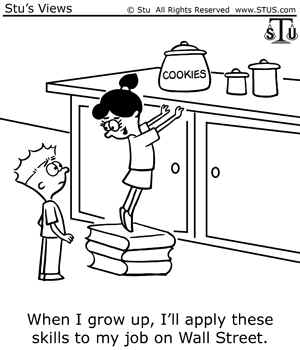
http://www.stus.com/images/products/blg5916.gif
HYPOCRITICAL US SENATE DECLARES
CLASS WAR ON MAIN STREET
MAKE THE WORKING CLASS BEG FOR A JOB!
"In the US, class war means just one thing.
It means the Rich attacking the Poor"
HL Mencken - July 26, 1920
by William Schmidt, Ph.D. (Columbia University)
Not for nothing is the US Senate considered a millionaire's club. Half
of the Senators now are millionaires. Many are worth many, many times that. It takes
millions of dollars to run for the Senate. And the size of campaign contributions
to the Senate is astronomical. Critics say they are plutocrats, bought and paid for
by big money. It's hard to argue otherwise this year. The evidence shows the
Senate favored giving a trillion to Wall Street and NOTHING to blue-collar Main Street.
As a group, the Senate's rich man's bias comes across loud and clear. When
the US House of Representatives first said "NO" to Paulson's $700 Billion bailout
of Wall Street, the US Senate said "Yes", even though public opposition in the US
to this give-away was 10:1. Then today, when the House voted "YES" for providing a
paltry $14 billion to the US auto industry, the Senate said "NO".
The founders of the US Constitution were afraid of democracy, "mob rule"
and an urban and bloody French Revolution in the US. They were mostly wealthy
land owners, many of whom had hundreds of slaves. "The people" were not to be
trusted. They should be given the appearance of representation to lull them into
acceptance of the status quo. But political leaders in the US should be
strictly insulated from the ordinary people. That was the purpose of the Senate.
Senators were to have special powers and 6 year-terms. Rural areas of
low population were given disproportionate political power. Urban populations
were to be feared and under-represented. Thus, we have the ridiculous anomaly
wherein two Senators come from each state, no matter how big or small the state's
population is. Presently, the seven least populated states have 14% of the Senators,
despite having only 1.4% of the US population. California has 12% of the
US population and 2% of the Senators. Undemocratically, 50% of all the Senators
are voted into office by a majority of only 20% of the population. The US Constitution is
steeped in plutocracy! Given how selfish, incompetent and lacking in compassion
the corporate and political rich generally now are, someone should start to ask:
"Can the US continue to afford a hopelessly unrepresentative and plutocratic US
Senate?"
Even today, a new scandal is emerging. A former chairman of the
NASDAQ cost investors $50 BILLION in a scheme, he himself called a
"Giant Ponzi scheme". See Wall St. Warrior: Giant Ponzi Scheme
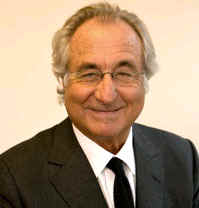 "Madoff told agents who went to his apartment to arrest him that there was "no innocent explanation" for his activities, The Wall Street Journal reported. Madoff told the agents he was "broke" and had decided his scheme "could not go on" and said he expected to go to jail, the newspaper reported. |
"Madoff reportedly broke the news to his sons earlier this week,
telling them he had "absolutely nothing" and "it's all just one big
lie." "Individuals who had entrusted their wealth to Madoff were in shock. "This is going to kill so many people," said a current investor quoted by the Journal. "It's absolutely awful." "A New Jersey man said he was "in a state of panic." He said his family
had about $1 million invested in Madoff's firm. His 86-year-old mother-in-law depended on
the fund for her living expenses, he said." |
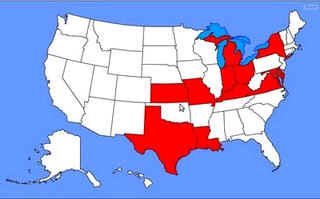
States
with GM Plants
Senators Who Said "NO" to Bailout of GM/Chrysler
The $16 billion automobile industry aid bill passed
the House of Representatives
in a vote that was largely along party lines, with a good three dozen Republicans crossing
over to vote in favor. The bill was defeated in the Senate by a handful of
Southern Republican
Senators and dozens of other Senators, who have avoided publicly going on record.
Democrat
Harry Reid let the effort die on a procedural vote, thereby protecting his colleagues
from having to go on record.
Bob Corker - Republican -
Tennessee
Corker is a first-term Republican Senator and millionaire real estate developer
from Tennessee. He, sought to broker a deal which would have required the UAW to
make major wage and benefit concessions. The UAW refused. Tennessee has a
Nissan
plant and is soon getting a plant from Volkswagen, Europe's largest carmaker.
Specifically
Corker sought:
* Require UAW to accept equity for half of the payments owed by automakers
to the UAW-aligned trust fund known as a voluntary employee beneficiary association
(VEBA).
* Require the "all-in" labor costs and work rules of the Detroit Three be
immediately
brought on par with foreign carmakers such as Nissan, Toyota and Honda. This would have
meant a dramatic drop in health care benefits.
* End the union's jobs bank that requires payments to some autoworkers up to
four years after their jobs ended.
Mitch McConnell - Republican
- Kentucky won by 52.9% in 2008 to 47.1% for opponent.
Jim Bunning - Republican -
Kentucky An ex-major league pitcher who grew up in Cincinnati..
Richard Shelby -
Republican - Alabama
"Companies fail everyday and others take their place. I think this is a road we
should not go down," ( http://www.marinij.com/business/ci_10999492
)
Also, Hutchison, Kay
Bailey (REP Texas) Cornyn,
John (REP Tex) Warner, John
(REP Virginia)
and Jon Kyl - Republican - Arizona
( http://www.newsdaily.com/stories/tre4ba6pq-us-autos-bailout-corker/
)
The Market's Malaise Could Get Much
Worse
The media says
the domestic "auto industry is bloated and outdated". Well,
I have bought 3 Fords in the last 20 years. Each has run fine. No
problems! Maybe,
I was just lucky. Republican Senators say the union autoworkers are "too
greedy" (compared to
Wall Street!?) for wanting health insurance and not being willing to give it
up. The
media has now reluctantly admitted that the UAW auto workers average pay is NOT
$70/hour,
as lying right-wing propagandists have falsely claimed and that their pay was quite
comparable
to the pay of non-union auto workers in Tennessee and Kentucky, who work in
foreign owned automakers.
Three million more may
now soon go unemployed in the US. Just when the
public thought that the US political leadership could not possibly look more inept,
cavalier, insulated and elitist, the US Senate shows they really do have no
compassion.
Like proud sadists, they all but proclaim their wish to destroy unions and make
workers beg for any jobs. Confidence is now gone. The Senate has now gone into
Christmas recess, two weeks before the holiday, having done NOTHING. If nothing
changes, a distrust of Washington and America as being a pure plutocracy, will
spawn universal bitterness. This will corrode and destroy confidence in America
and stock prices.
December is usually a bullish period on Wall Street. Optimism and good will
are strong sentiments after the 17th of the month. The DJI has rallied 89% of the
time
in the last two weeks of December since 1966. But the bitterness of class
war is now released and will grow and grow. As thousands are laid off, the season's
optimism, charity and good will seem off-key and humbug. Without that seasonal
buoyancy, tax loss selling is apt to continue to have the upper hand, throughout
December.
Class War Hurts The Stock Market
It should be obvious that the economy needs a well-paid American work force.
Henry Ford paid his workers $5 a day after World War I, so that they would be able
to buy one of his cars. The deliberate impoverishment of American workers - as the
Senate has done by saying "NO" to a loan to keep GM and Chrysler in business -
greatly reinforces the forces of deflation and unemployment, and so badly
hurts American business and stock prices.
Inter-class hostility grew strong in the Depression. That badly damaged
Wall Street's performance throughout the 1930s. Less well know is how
widespread
was the class warfare waged by the rich on workers between 1917 and 1921. This
period saw some sharp sell-offs of stocks. Look back at the history of
this period.
The Bolshevik Revolution took place in November 1917. A Red Scare dominated
the mainstream media and politics for years. Union activists were rounded up
and put in jail, ostensibly for opposing the US involvement in World War I,
but really because the dominant class
did not want to pay higher wages to an
organized labor.
These Palmer Raids led to a bomb being exploded in Wall Street
in November 1920.

http://en.wikipedia.org/wiki/Wall_Street_bombing
http://en.wikipedia.org/wiki/Palmer_Raids
Only Unions Can Be Trusted To Protect
American Workers
Without labor unions American workers have little to protect them against the
trend since the 1970s, in which their real wages and their standard of living steadily
decline.
The
long report I did this past Labor Day on the history of American workers from
1890
to 1942 - American
Labor's Untold
Story showed that American workers can not depend
upon
politicians to defend their interests and rights. Two years ago, I showed how
lower unionization and
lower pay have gone hand in hand while the relative pay for CEOs and
the exporting of jobs has
risen very sharply since Reagan. There is more to say about
this
vital topic, for if American workers are not paid properly, the entire US economy
and
the stock market will suffer badly.
Republicans offer little or no protection for American workers. The Republican Party
has for 150 years openly represented the very wealthy and corporations, always saying that
a strong economy would mean wealth would trickle down. But the scraps that
have fallen down
have not been enough to prevent the standard of living to fall for tens of millions.
And just
like Republican pro-business policies in the 1920s did not prevent the Great Depression,
but actually brought it on by encouraging wild speculation on Wall Street and
causing a severe maldistribution of wealth, so, too Bush's exclusively pro-business
policies
have brought on the Second Great Depression in 2008. While it's true that many small
business owners favor Republicans, because they have reduced government regulations,
it is this very lack of regulations which has led directly to the Stock Market Collapse.
of 2008. I spelled this out on my Blog of 10/12/2008, "The Causes of The
Crash of 2008".
Democrats are somewhat better at representing the interests of workers. But
historically
the biggest reforms they have introduced were first campaigned for by minority workers'
parties:
40 hour work week, social security, banning of child labor, mine safety and income tax.
Obama spent his whole campaign talking about the interests of the "middle
class", who
said included families making 1/4 million dollars a year. Absent completely
from his
vocabulary was "the working poor". This is not surprising. Obama
needed to raise huge
amounts to run his Presidential Campaign. Poor people have little money to give.
So, the Democrats get massive campaign contributions from many of the same corporations
that Republicans do. Thus, Clinton supported NAFTA and manufacturing jobs in
the US
dwindled and disappeared under his Presidency, even before Bush opened the flood-gates
for
jobs and US companies to go overseas.
So, on balance, I would say that unions are the average workers' main defense, even
for non-union members. Did I hear you mutter "union corruption"?
There is some.
Nests are feathered. But what there is does not begin to compare with the magnitude
and pervasiveness of Republican graft. Google "Tom DeLay",
"Jack Abramoff" or "Randy
Cunningham". Google "Enron", "Tyco", "Adelphia",
"World.Com", "Halliburton".
Read also I written here about how the SEC has looked the other way, instead of regulating
and penalizing insider trading, organized short selling and Wall Street
"Ponzi" schemes.
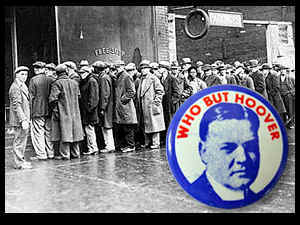
http://mises.org/story/2902
Hoover's
Reaction to The Depression.
The
economist JM Keynes cut through all the self-interested malarky, Chamber of
Commerce
distortions and clever academic excuses offered to explain the depths
of
the Great Depression by limited intervention monetarists (Chicago School of Economics)
and
the lassez-faire advocates of zero governmental intervention. Keynes said
simply
that
severe economic downturns were caused by a lack of aggregate Demand for goods and
services.
When total Demand drops, businesses sell less, cut back production and lay off
workers.
That higher unemployment reduces Demand coming from private consumers and
from
business. In this situation it is therefore up to Government to make up for the
dropping
Demand.
Keynes did not view that it was acceptable to make workers go for years without
adequate
work, when a solution was at hand. The Kenesian solution for an Economic
Depression
was for both direct government spending (public works) and government
encouragement
of personal and business Demand, usually by lowering taxes on those
who
spend the highest percentage of their income. Since poor people spent 100%
of
any new money they got, it was best for the government to provide them jobs and
tax
incentives. Money and tax breaks given to rich people and Banks would probably
not
be spent immediately. See also my discussion of the self-perpetuating
dynamics
of deflation
and the prescient
comments of the NYU economist Nouriel Roubini.
Hoover's
Treasury Secretary, Andrew Mellon believed that the laissez-faire economic policies
had
built the prosperity of the 1920’s and he favored letting natural economic forces
(namely,
decisions by private investors) solve the crisis of financial and economic crises
after
the 1929 Crash. Even two years after the Crash, Mellon stated:
"Liquidate labor,
liquidate stocks, liquidate the farmers, liquidate real estate. . . .
[That]
will purge the rottenness out of the system. High costs of living and high
living
will come down. People will work harder, live a more moral life. Values will
be
adjusted, and enterprising people will pick up the wrecks from less competent people"
(
Source: http://www.theviewfromthepeak.net/newsblog/2008/10/did-laissez-faire-cause-great.html )
Hoover
did not fire Mellon. He kept him at his side throughout his Presidency.
Though
Hoover
favored an investigation in rigged short selling, he deferred to Mellon and
did
not act forcefully to curb Wall Street investment and trading abuses, even though
he
himself recognized their deleterious effect on stock prices. Hoover believed that
the
Federal
Government had no constitutional jurisdiction over short sellers, excessive margin
or
rigged trading on Wall Street. His wish was to study the problem, not legislate
against
the
very practices on Wall Street that made the decline in prices much worse than they
need
to have been. Still, it is not accurate to say he sat on his hands entirely,
as unemployment
rose
and rose. He did initiate some very big and very visible public works
programs, such
as
Boulder Dam and the San Francisco Bay Bridge. Finally, in July 1932, the Federal
Home
Loan Bank was set up to discount home mortgages. But Hoover would not buck
the
powerful insurance industry lobby. So, the legislation was not made universal.
Apologists
point
to his 1932 election speeches, wherein he boasted to his measures to reverse the
depression.
But the truth is plain to see, despite their efforts to ofuscate. Hoover did
not
do nearly enough and he gave his laissez-faire Treasury Secretary too much
power.
Keynes and The Making of JFK's
"Demand-Side" Tax Cut in 1963
and
Reagan's "Supply-Side" Business Tax Cuts in 1983.
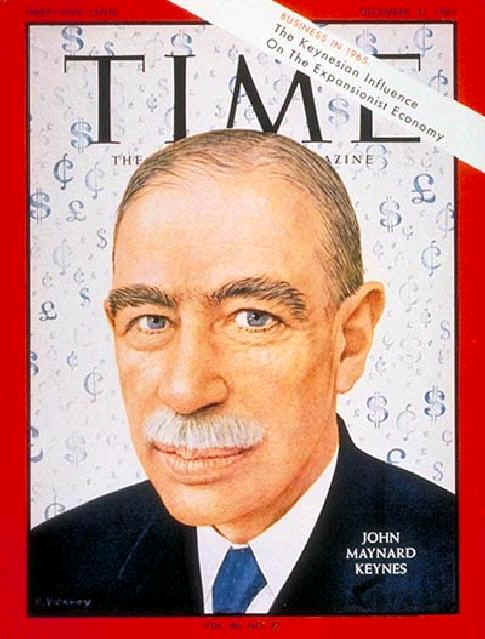
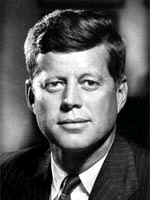
Keynes had a huge impact of
John Kennedy. JFK spoke to my graduating
class
at Yale in June of 1962. He acknowledged how much Keynes ideas had been to him
in
deciding to lower taxes for all consumers, not businesses, as an economic stimulus.
"When Kennedy ran for president in 1960 amid a sluggish
economy, he vowed to "get the country
moving
again." After his election, his advisers, led by chief economist Walter Heller,
urged a
classically
Keynesian solution: running a deficit to stimulate growth. (The $10 billion deficit
Heller
recommended, bold at the time, seems laughably small by today's standards.) In
Keynesian
theory, a tax cut aimed at consumers would have a "multiplier" effect, since
each
dollar that a taxpayer spent would go to another taxpayer, who would in effect spend it
again—meaning
the deficit would be short-lived. At first Kennedy balked at Heller's
Keynesianism.
He even proposed a balanced budget in his first State of the Union address.
But
Heller and his team won over the president. By mid-1962 Kennedy had seen the
Keynesian
light, and in January 1963 he declared that "the enactment this year of tax
reduction
and tax reform overshadows all other domestic issues in this Congress."
( http://www.slate.com/id/2093947/ )
In the 1980s, Reagan's tax cuts were "Supply-Side", meaning
that the tax cuts went
to
businesses and corporations. Since American workers were not given much more
buying
power, a great deal of the increase in US production had to be sold overseas.
In
1985 and 1986, Reagan's massive firing of members of the nation's air traffic
controllers
severely
crippled the power of American unions. With unions weakened, American
workers
lost
political clout. Soon jobs were being exported and NAFTA was approved by Democrat
William
Clinton. Though the advent of personal computers and the internet boosted the
US
economy mightily in the 80s and 90s, real wages in the US kept falling. By 2008,
the
US had became heavily dependent upon services not manufacturing. In these
circumstances,
aggregate
demand could not keep up with the supply of goods (particularly houses and
cars)
and the stage was set for an economic down-turn. I believe the economic decline was
made
much worse by the hugely wasteful goverment spending for Bush's war on Iraq,
now
estimated to e $3 trillion, and the failure of the US government to properly regulate
home
buying, banks and Wall Street, much like what happened in the 1920s.
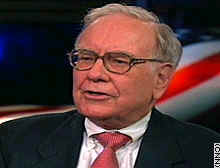
Warren
Buffet told Lew Dobbs: "Rich people are doing so well in this country.
I
mean, we never had it so good... It's class warfare, my class is winning,..Just take the
estate tax,
less
than 2 percent of all estates pay any tax. A couple million people die every year,
(now
only) 40,000 or so estates get taxed..."
(
Source: http://www.cnn.com/2005/US/05/10/buffett/index.html
)
BUSH'S CLASS WAR ON AMERICAN WORKERS
The US Senate are not the only Class Warriors against American workers.
George Bush came into office in 2001 and almost immediately a recession followed.
What better way to discipline American workers and make them beg for just any
job?! Bush's tax cuts saved the very rich billions. His war gave billions to
favored
war contractors like Halliburton. His lack of regulation brought fabulous wealth to
a small number of Wall Street's super-rich, but it produced a disastrous housing
bubble and over-speculation in commodities. Ordinary workers gained nothing
from Bush. Median real family income fell from 2001 to 2007. Millions of US
jobs went overseas, so that corporations could report higher profits. Private sector
jobs fell behind population growth. The number of people who got health care
at work fell from 64.2 million to 59.7 million. "Between 2001 and 2007, the
number of people in poverty rose from 31.6 million to 36.5 million... Home heating
oil went up about 150 percent. Gas at the pump at least doubled. The cost of health
insurance went up about 50 percent. The cost of college went up about 30 percent."
The US national debt rose $3.5 trillion from 2001 to 2007. Consumer debt
rose by $5.15 Source.
CEO pay rose sharply
compared with the wages of average
workers under Bush. CEOs in 2007 made more money in one day than the
average worker made in a year. The ratio of average CEO pay to average worker
pay rose from 40:1 to 400:1 between 1981 and 2007. Wealth was more concentrated
in the US than at any time in 2006 than since 1928. And we all know what happened
in 1929. Trickle down does not work. And the decisions made by the very rich
are
short-sightedly selfish and disastrous for the entire economy. Greenspan now admits
his greatest failure was to understand how narrowly selfish and shortsighted his
biggest banking clients were.
A Firm's Bankruptcy Puts Workers at High Risk
As unsecured creditors, laid off workers usually go to the back of the creditors' line.
The Federal Bankruptcy Court typically only pays for services needed to keep the business
in operation. Debt for Payroll and Benefits Due are usually contested by other
creditors.
http://www.democraticunderground.com/discuss/duboard.php?az=show_mesg&forum=102&topic_id=3632058&mesg_id=3632058
This is what will happen to workers at GM.
Poverty Is Real and Getting Much Worse.
Jul 15, 2008 "I am a single mother with a
9-year-old boy. To stay warm at night my son
and I would pull off all the pillows from the couch and pile them on the kitchen floor.
I'd hang
a blanket from the kitchen doorway and we'd sleep right there on the floor. By February we
ran
out of wood and I burned my mother's dining room furniture. I have no oil for hot water.
We
boil our water on the stove and pour it in the tub. Source.
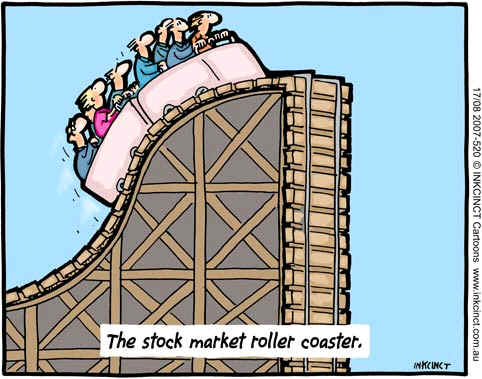
DJI: 1917-1921
Class war hurts the stock market. In May the December 1917, the
DJI fell from 99 to 66, a fall of 33%. By October 1919 it had recovered back to 119,
only to fall to 64 by August 1921.
---------------------------------------- 1917
---------------------------------------------------------------
- April 6 : The US enters WWI
- Creation of the Creel Committee for Public Information (censorship and propaganda)
-
- Espionage Act restricting freedom of expression on National Security grounds.
- The Literacy test made compulsory for new emigrants, over Wilson’s Veto.
- Oct-Nov the Russian Revolution

-------------------------------------------- 1918
---------------------------------------------------------
- Nov 11 The Armistice
- The Sedition Act amending the Espionage Act
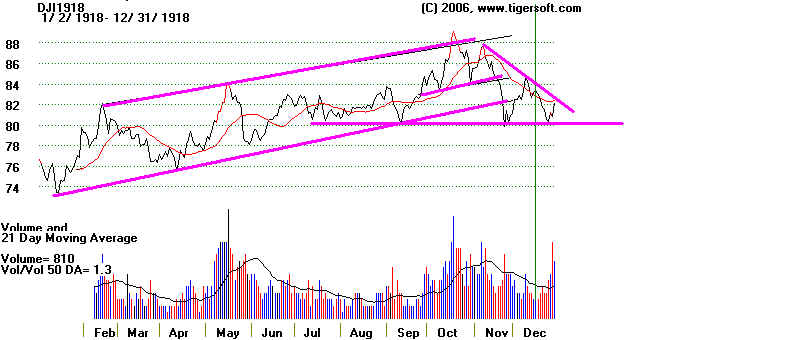
-------------------------------------------- 1919
--------------------------------------------------------
- A strike wave, involving 4 million workers: Seattle general strike,
Boston police strike, Steel strike, rent strikes. Bombings and disturbances.
Chicago race riots, and in other big cities.
- Creation of the American Communist party.
- The FBI created to control and inform on radicals, anarchists and other
alleged subversives. J. Edgar Hoover = its first director
- The 18th Amendment on the prohibition of the production and sale of alcohol
adopted, to become effective on Jan 1, 1920. (repealed 1933)
- Shenk v. U. S. on freedom of speech, the crafting of the “clear and present
danger doctrine” (Justice Holmes)
- 1919-1920 : The Red Scare and the Palmer raids (named after
Attorney General Mitchell Palmer) notably against anarchists
and the IWW (Industrial Workers of the World union)
- Emma Goldman deported. She was a left-wing intellectual Mencken tried to help.
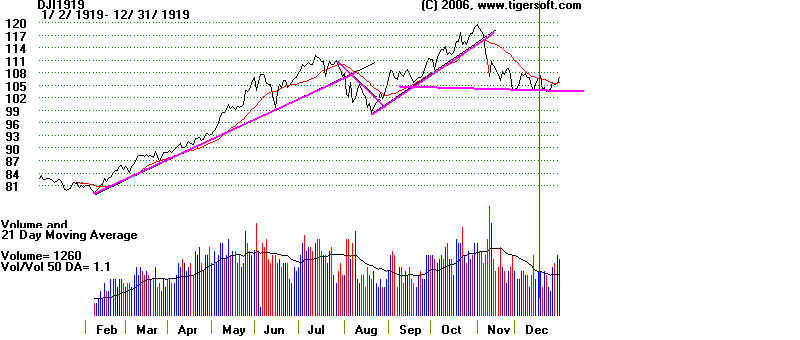
-------------------------------------------- 1920
-------------------------------------------------------
- April 15: Arrest of Sacco and Vanzetti for armed robbery and murder in Baintree,
Mass.
- Warren G. Harding (R) (Jan 1921 – 1923), from Ohio, elected president, the
first of three
successive Republican administrations. Credited with the slogan “back to normalcy
“.
- Ford introduces the moving assembly line producing one car every 60 seconds
- Over 50% of Americans live in cities (census results)
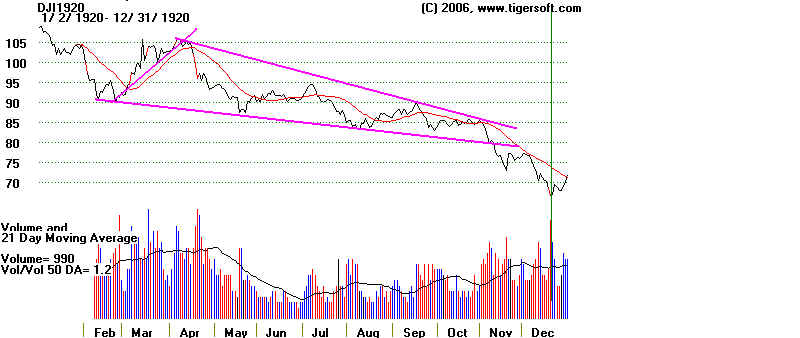
-------------------------------------------- 1921
-------------------------------------------------------
- The first Emergency Quota Law (or Johnson Act) restricting immigration.
- May 21: the first trial of Sacco and Vanzetti.
- Short postwar depression leads to 5 million unemployed. Farmer protests.
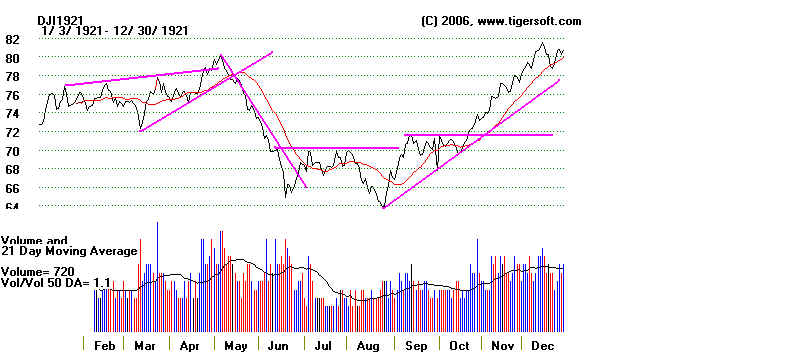
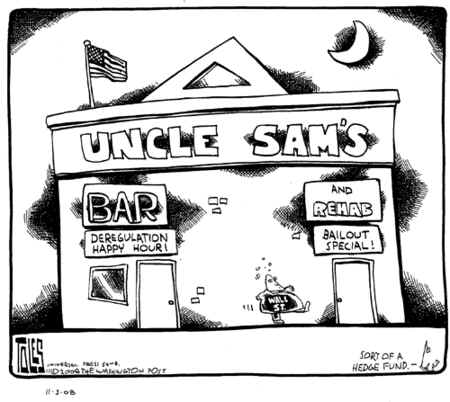
http://runningofthebulls.typepad.com/toros_running_of_the_bull/2008/11/satirical-wall-street-cartoon.html
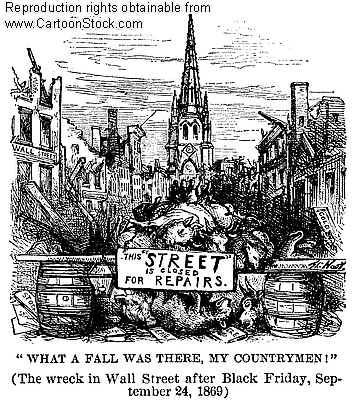
http://www.cartoonstock.com/vintage/directory/w/wall_street.asp

http://www.inkcinct.com.au/Web/CARTOONS/2007/2007-520-stock-market-roller-coaster.jpg